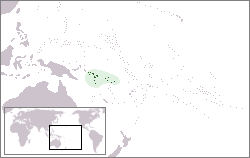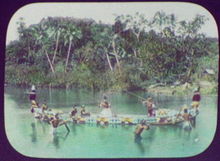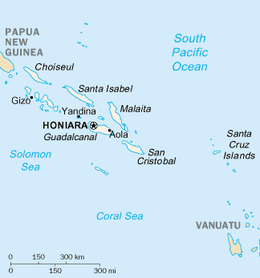Solomon Islands
2007 Schools Wikipedia Selection. Related subjects: Countries; Geography of Oceania (Australasia)
| Solomon Islands | |||||
|
|||||
| Motto: To Lead is to Serve | |||||
| Anthem: God Save Our Solomon Islands Royal anthem: God Save the Queen |
|||||
| Capital (and largest city) |
Honiara |
||||
| Official languages | English | ||||
|---|---|---|---|---|---|
| Government | Constitutional monarchy | ||||
| - Queen | Elizabeth II | ||||
| - Governor-General | Nathaniel Waena | ||||
| - Prime Minister | Manasseh Sogavare | ||||
| Independence | from the UK | ||||
| - Date | 7 July 1978 | ||||
| Area | |||||
| - Total | 28,896 km² ( 142nd) 11,157 sq mi |
||||
| - Water (%) | 3.2% | ||||
| Population | |||||
| - July 2005 estimate | 478,000 ( 167th) | ||||
| - Density | 17/km² ( 189th) 43/sq mi |
||||
| GDP ( PPP) | 2005 estimate | ||||
| - Total | $911 million ( 171st) | ||||
| - Per capita | $1,894 ( 146th) | ||||
| HDI (2003) | 0.594 (medium) ( 128th) | ||||
| Currency | Solomon Islands dollar ( SBD) |
||||
| Time zone | ( UTC+11) | ||||
| Internet TLD | .sb | ||||
| Calling code | +677 | ||||
The Solomon Islands is a nation in Melanesia, east of Papua New Guinea, consisting of nearly one thousand islands. Together they cover a land mass of 28,400 square kilometres (10,965 sq mi). The capital is Honiara, located on the island of Guadalcanal.
The Solomon Islands have been inhabited by Melanesian people for at least 30,000 years. The United Kingdom established a protectorate over the Solomon Islands in the 1890s. Some of the most bitter fighting of World War II occurred on these islands. Self-government was achieved in 1976 and independence two years later. The country remains a Commonwealth Realm.
Since 1997 ethnic violence, government misconduct and crime have undermined stability and civil society. In June 2003 an Australian-led multinational force, the Regional Assistance Mission to the Solomon Islands (RAMSI), arrived to restore peace and disarm ethnic militias.
History
The Solomon Islands have been inhabited by Melanesians for over 30,000 years. Polynesian settlers began to arrive in 4,000 BC. The first European to discover the islands was Pedro Sarmiento de Gamboa in 1568. Missionaries began visiting the Solomons in the mid-1800s. They made little progress at first, because " blackbirding" (the often brutal recruitment of laborers for the sugar plantations in Queensland and Fiji) led to a series of reprisals and massacres. The evils of the labor trade prompted the United Kingdom to declare a protectorate over the southern Solomons in 1893. In 1898 and 1899, more outlying islands were added to the protectorate; in 1900 the remainder of the archipelago, an area previously under German jurisdiction, was transferred to British administration apart from the islands of Buka and Bougainville which remained under German administration as part of German New Guinea until occupied by Australia in 1914 at the commencement of World War I. Traditional trade and social intercourse between the western Solomon islands of Mono and Alu (the Shortlands) and the traditional societies in the south of Bougainville, however, continued without hindrance. Under the protectorate, missionaries settled in the Solomons, converting most of the population to Christianity.
In the early 20th century, several British and Australian firms began large-scale coconut planting. Economic growth was slow, however, and the islanders benefited little. With the outbreak of World War II, most planters and traders were evacuated to Australia, and most cultivation ceased. Some of the most intense fighting of World War II occurred in the Solomons. The most significant of the Allied Forces' operations against the Japanese Imperial Forces was launched on August 7, 1942 with simultaneous naval bombardments and amphibious landings on the Florida Islands at Tulagi and Red Beach on Guadalcanal. The Battle of Guadalcanal became an important and bloody battle fought in the Pacific War and the Allies begin to repulse the Japanese expansion. Of strategic importance in the during the war were the coastwatchers who provided intelligence of Japanese naval, army and aircraft movements during the campaign. Sergeant-Major Jacob Vouza was a notable coastwatcher who refused to divulge Allied information inspite of interrogation and torture by Japanese Imperial forces. He was awarded the highest award for bravery by the Americans. Islanders Biuku Gasa and Eroni Kumana would be noted by National Geographic for being the first to find the shipwrecked John F. Kennedy and his crew of the PT-109. They suggested using a coconut which was later kept on the desk of the president to write a rescue message for delivery by dugout canoe.
Following the end of World War II, the British colonial government returned. The capital was moved from Tulagi to Honiara to take advantage of the infrastructure left behind by the U.S. military. A native movement known as the Marching Rule defied government authority. There was much disorder until some of the leaders were jailed in late 1948. Throughout the 1950s, other indigenous dissident groups appeared and disappeared without gaining strength. In 1960, an advisory council of Solomon Islanders was superseded by a legislative council, and an executive council was created as the protectorate's policymaking body. The council was given progressively more authority. In 1974, a new constitution was adopted establishing a parliamentary democracy and ministerial system of government. In mid-1975, the name Solomon Islands officially replaced that of British Solomon Islands Protectorate.
On January 2, 1976, the Solomons became self-governing, and independence followed on July 7, 1978, the first post-independence government was elected in August 1980. The series of governments formed from there on have not performed to upgrade and build the country. Following the 1997 election of Bartholomew Ulufa'alu the political situation in the Solomon's began to deteriorate. Governance was slipping as the performance of the police and other government agencies deteriorated due to ethnic rivalries. The capital of Honiara on Guadalcanal was increasingly populated by migrants from the island of Malaita. In June 2002, an insurrection mounted by militants from the island of Malaita resulted in the brief detention of Ulufa’alu and his subsequent forced resignation. Manasseh Sogavare, leader of the People's Progressive Party, was chosen Prime Minister by a loose coalition of parties. Guadalcanal militants retaliated and sought to drive Malaitan settlers from Guadalcanal, resulting in the closure of a large oil-palm estate and gold mine which were vital to exports. New elections in December 2002 brought Sir Allan Kemakeza into the Prime Minister’s chair with the support of a coalition of parties.
Kemakeza attempted to address the deteriorating law and order situation in the country, but the prevailing atmosphere of lawlessness, widespread extortion, and ineffective police, prompted a formal request by the Solomon Islands Government for outside help. With the country bankrupt and the capital in chaos, the request was unanimously supported in Parliament. In July 2003, Australian and Pacific Island police and troops arrived in the Solomon Islands under the auspices of the Australian-led Regional Assistance Mission to the Solomon Islands (RAMSI). A sizable international security contingent of 2,200 police and troops, led by Australia and New Zealand, and with representatives from about 20 other Pacific nations began arriving the next month under Operation Helpem Fren. Since this time some commentators have considered the country a failed state.
In April 2006 allegations that the newly elected Prime Minister Snyder Rini had used bribes from Chinese businessmen to buy the votes of members of Parliament led to mass rioting in the capital Honiara. A deep underlying resentment against the minority Chinese business community led to much of Chinatown in the city being destroyed. China sent chartered aircraft to evacuate hundreds of Chinese who fled to avoid the riots. Further Australian and New Zealand troops were dispatched to try to quell the unrest. Rini eventually resigned before facing a motion of no confidence in Parliament, and Parliament elected Manasseh Sogavare as Prime Minister.
Politics
The Solomon Islands are a constitutional monarchy and have a parliamentary system of government. The Queen is the head of state, she is represented by the Governor-General who is chosen by the Parliament for a 5-year term. There is a unicameral parliament of 50 members, elected for 4-year terms. However, Parliament may be dissolved by majority vote of its members before the completion of its term. Parliamentary representation is based on single-member constituencies. Suffrage is universal for citizens over age 18. The head of government is the Prime Minister; the Prime Minister is elected by Parliament and chooses the other members of the cabinet. Each ministry is headed by a cabinet member, who is assisted by a permanent secretary, a career public servant, who directs the staff of the ministry.
Solomon Islands governments are characterized by weak political parties (see List of political parties in Solomon Islands) and highly unstable parliamentary coalitions. They are subject to frequent votes of no confidence, and government leadership changes frequently as a result. Cabinet changes are common.
Land ownership is reserved for Solomon Islanders. The law provides that resident expatriates, such as the Chinese and Kiribati, may obtain citizenship through naturalization. Land generally is still held on a family or village basis and may be handed down from mother or father according to local custom. The islanders are reluctant to provide land for nontraditional economic undertakings, and this has resulted in continual disputes over land ownership.
No military forces are maintained by the Solomon Islands, although a police force of nearly 500 includes a border protection unit. The police also are responsible for fire service, disaster relief, and maritime surveillance. The police force is headed by a commissioner, appointed by the governor-general and responsible to the prime minister. The current commissioner is an Australian.
Provinces
For local government, the country is divided into 10 administrative areas, of which nine are provinces administered by elected provincial assemblies, and the 10th is the town of Honiara, administered by the Honiara Town Council.
- Central
- Choiseul
- Guadalcanal
- Honiara, Town
- Isabel
- Makira-Ulawa
- Malaita
- Rennell and Bellona
- Temotu
- Western
Foreign relations and the military
Solomon Islands is a member of the United Nations, Commonwealth, South Pacific Commission, South Pacific Forum, International Monetary Fund, and the European Economic Community/African, Caribbean, Pacific Group (EEC/ACP)/(Lome Convention).
The political stage of the Solomon Islands is further influenced by its diplomatic importance to the Republic of China on Taiwan and the People's Republic of China. The Solomon Islands gives diplomatic recognition to the ROC, recognizing it as the sole-legitimate Government of all of China, giving Taiwan vital votes in the United Nations. Lucrative investments, political funding and preferential loans from both the ROC and PRC are increasingly manipulating the political landscape of the Solomon Islands.
Relations with Papua New Guinea, which had become strained because of an influx of refugees from the Bougainville rebellion and attacks on the northern islands of the Solomon Islands by elements pursuing Bougainvillean rebels, have been repaired. A peace accord on Bougainville confirmed in 1998 has removed the armed threat, and the two nations regularized border operations in a 2004 agreement.
There is currently no regular military of the Solomon Islands. The various paramilitary elements of the Royal Solomon Islands Police (RSIP) were disbanded in 2003 following the intervention of the Regional Assistance Mission to the Solomon Islands (RAMSI), and the RSIP was disarmed. RAMSI has a small military detachment headed by an Australian commander with responsibilities for assisting the police element of RAMSI in internal and external security. The RSIP still operates two patrol boats (RSIPV Auki and RSIPV Lata) which constitute the navy of the Solomon Islands.
In the long-term it is anticipated that the RSIP will resume the defence role. The police force is headed by a commissioner, appointed by the governor general and responsible to the prime minister.
The police budget of the Solomon Islands has been strained due to a four-year civil war. Following Cyclone Zoe's strike on the islands of Tikopia and Anuta in December 2002, Australia had to provide the Solomon Islands government with 200,000 Solomons ($50,000 Australian) for fuel and supplies for the patrol boat Lata to sail with relief supplies. (Part of the work of RAMSI includes assisting the Solomon Islands Government to stabilise its budget.)
Geography
The Solomon Islands is a wide island nation that lies East of Papua New Guinea and consists of many islands: Choiseul, the Shortland Islands; the New Georgia Islands; Santa Isabel; the Russell Islands; Nggela (the Florida Islands); Malaita; Guadalcanal; Sikaiana; Maramasike; Ulawa; Uki; Makira ( San Cristobal); Santa Ana; Rennell and Bellona; the Santa Cruz Islands and three remote, tiny outliers, Tikopia, Anuta, and Fatutaka. The distance between the westernmost and easternmost islands is about 1,500 kilometres (930 mi). The Santa Cruz Islands (of which Tikopia is part), are situated north of Vanuatu and are especially isolated at more than 200 kilometres (120 mi) from the other islands. Bougainville is geographically part of the Solomon Islands, but politically Papua New Guinea.
The islands' ocean-equatorial climate is extremely humid throughout the year, with a mean temperature of 27° C (80° F) and few extremes of temperature or weather. June through August is the cooler period. Though seasons are not pronounced, the northwesterly winds of November through April bring more frequent rainfall and occasional squalls or cyclones. The annual rainfall is about 3050mm (120 in).
The Solomon Islands archipelago is part of two distinct terrestrial ecoregions. Most of the islands are part of the Solomon Islands rain forests ecoregion, which also includes the islands of Bougainville and Buka, which are part of Papua New Guinea, these forests have come under pressure from forestry activities. The Santa Cruz Islands are part of the Vanuatu rain forests ecoregion, together with the neighboring archipelago of Vanuatu. Soil quality ranges from extremely rich volcanic (there are volcanoes with varying degrees of activity on some of the larger islands) to relatively infertile limestone. More than 230 varieties of orchids and other tropical flowers brighten the landscape.
Economy
Its per capita GDP of $340 ranks Solomon Islands as a lesser developed nation, and more than 75% of its labor force is engaged in subsistence farming and fishing. Most manufactured goods and petroleum products must be imported. Until 1998, when world prices for tropical timber fell steeply, timber was Solomon Islands main export product, and, in recent years, Solomon Islands forests were dangerously overexploited. Other important cash crops and exports include copra and palm oil. In 1998 Ross Mining of Australia began producing gold at Gold Ridge on Guadalcanal. Minerals exploration in other areas continued. However in the wake of the ethnic violence in June 2000, exports of palm oil and gold ceased while exports of timber fell. The islands are rich in undeveloped mineral resources such as lead, zinc, nickel, and gold.
Exploitation of Solomon Islands' fisheries also offers prospects for export and domestic economic expansion. However, a Japanese joint venture, Solomon Taiyo Ltd., which operated the only fish cannery in the country, closed in mid-2000 as a result of the ethnic disturbances. Though the plant has reopened under local management, the export of tuna has not resumed. Negotiations are underway which may lead to the eventual reopening of the Gold Ridge mine and the major oil-palm plantation.
Tourism, particularly diving, is an important service industry for Solomon Islands. Growth in that industry is hampered, however, by lack of infrastructure and transportation limitations.
The Solomon Islands Government was insolvent by 2002. Since the RAMSI intervention in 2003, the government has recast its budget, and has taken a hard look at priorities. It has consolidated and renegotiated its domestic debt and with Australian backing, is now seeking to renegotiate its foreign obligations. Principal aid donors are Australia, New Zealand, the European Union, Japan, and the Republic of China.
Demographics
As of 2006 the majority 552,438 people on the Solomon Islands are ethnically Melanesian (94.5%). Polynesian (3%) and Micronesian (1.2%) are the two other significant groups.
There were 74 languages spoken in the Solomon Islands, although four of these are extinct. On the central islands, Melanesian languages are spoken, on the outliers Rennell and Bellona to the south, Tikopia, Anuta and Fatutaka to the far east, Sikaiana to the north east, and Luaniua ( Ontong Java Atoll, Lord Howe Atoll) to the north, Polynesian languages. Immigrant populations of Gilbertese (i-Kiribati) and Tuvaluans speak Micronesian languages. While English is the official language, only 1-2% of the population speak English; the lingua franca is Solomons Pijin.
Religion
The religion of Solomon Islands is about 96% Christian with following denominations: Church of Melanesia 33%, Roman Catholic 19%, Seventh-day Adventist 11%, United Church 10%, Other Christian 4%) and about 4% indigenous religious beliefs. .






